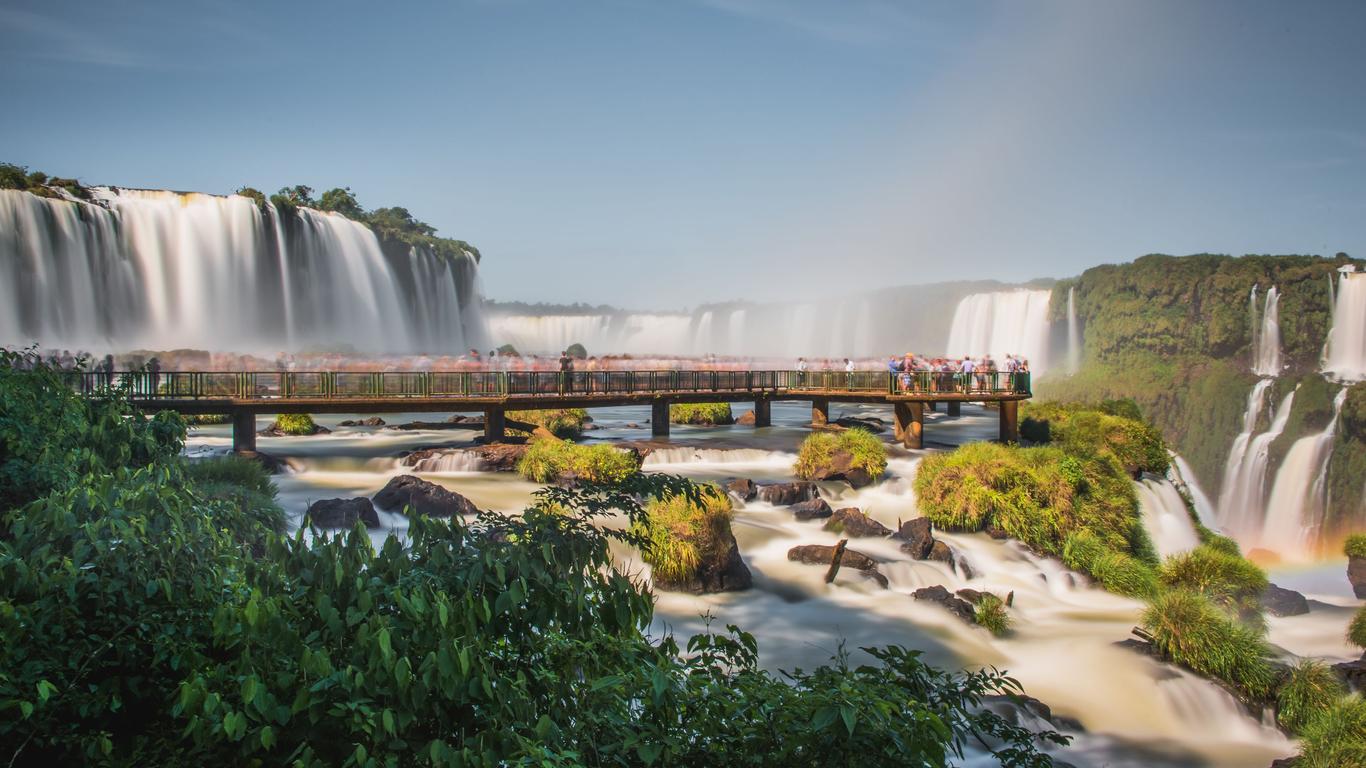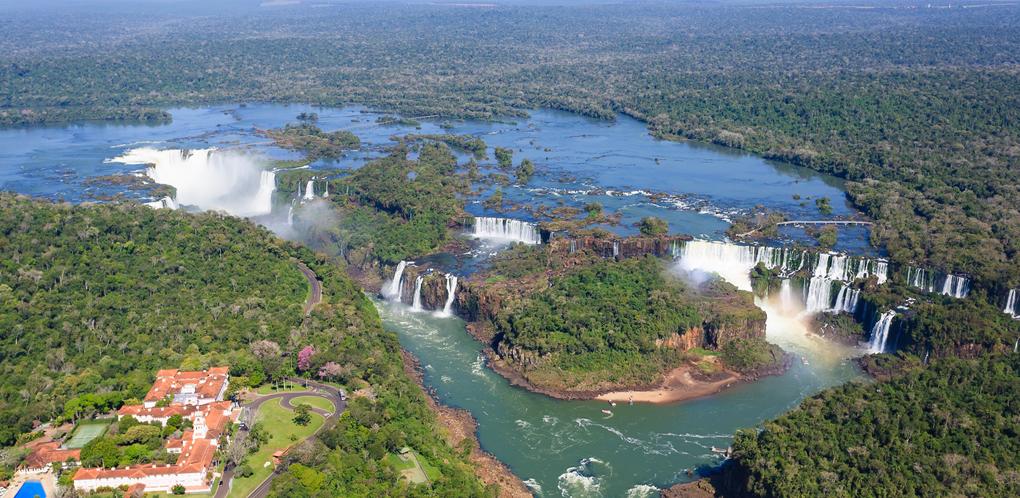
Puerto Iguazú travel guide
Puerto Iguazú Tourism | Puerto Iguazú Guide
You're Going to Love Puerto Iguazú
Puerto Iguazú is the gateway city for visitors entering Argentina to visit the internationally famed Iguazu Falls.

Top 5 Reasons to Visit Puerto Iguazú
1. Iguazú National Park
The subtropical rainforest and the Iguazu Falls within it account for the highest amount of visitors to the Puerto Iguazú region.
2. Culturas Park Iguazu
Here at this Cultural Park, you can view handicraft demonstrations, buy local gems and jewelry, and learn the history of the indigenous people.
3. Las Tres Fronteras
This area offers views over the river where three South American countries' borders meet - Paraguay, Argentina, and Brazil.
4. Güira Oga
Check out this nature park, which acts as a conservation place for native species of toucan and caiman.
5. La Aripuca
Visit a recreated trap, used by indigenous communities to catch animals without harming them, made out of 28 species of native salvaged trees.
What to do in Puerto Iguazú
1. Home Of Iguazú Falls
Brazil, Paraguay, and Argentina spread their borders alongside the Iguazú National Park, merging the cultures of 3 nations. The park has 275 waterfalls and is home to the famous 270 feet tall Iguazú Falls. The subtropical rainforest in Argentina's Misiones province is adjacent to Brazil's border. Marvel at the flora, fauna, bromelias, miltoneas, araucarias, ficus and the rest of the wondrous natural ecosystem that makes up the park. The park consists of cascades, river rapids and the echoing rapture of the waterfalls. You'll be surrounded by a plethora of wildlife, including toucans and coatis, and be able to observe it via the viewing platforms by the trails.
2. House Of Bottles
As you enter Puerto Iguazú, you'll come across signs posted directing visitors to a house built from thousands of 1/2 to 1-liter plastic and glass bottles of cola drinks. Casa de Las Bottellas is one of the most recognized houses in Puerto Iguazú. Designed to bring awareness of the damage cola drinks cause the environment, Alfredo Santa Cruz and his family created this home. The walls are made of 1200 plastic bottles, the roof contains 1300 cartons of tetra pack, the windows have 140 CD cases, and a living room chair and furniture are fashioned from plastic bottles.
3. Hummingbird Garden
Take a little tour of the Hummingbird Garden that adds beauty and color to Puerto Iguazú. Stroll the garden decorated with hummingbird feeders and a water fountain. Over 15 species of hummingbird visit the garden each day. Despite the numerous birds, the garden is quiet. Sit on a bench and watch the hummingbirds land on their feeders and greet their friends. Smile and take a photo of the turtle who lives in the pond in the midst of this hummingbird paradise.
4. Puerto Iguazú's Extraordinary Place Of Worship
Located in Plaza San Martin, the Virgen del Carmen Cathedral is Puerto Iguazú's main church. The cathedral was built in 1936 but has a unique architectural style not consistent with the 1930s. In 1986, the diagonally shaped building became a cathedral after the Diocese of Iguazú was formed. The pinkish and yellow interiors and rectangular windows differ considerably from those of European Catholic churches. The lack of stained glass windows, paintings or frescoes gives the cathedral its unusually minimalist appearance.
5. Wildlife Rescue, Rehabilitation And Breeding Center
Take a guided tour of this magnificent wildlife reserve and animal hospital that starts with a film describing the territory of the Misiones and its environment. Named in honor of naturalist Andrés Giai, the Güirá Oga Center is a 19-hectare wildlife rescue, rehabilitation and breeding center housing animals that have suffered due to accidents or buyer's remorse, or been confiscated by the government. The center offers guided tours of the animals being rehabilitated. These include coatis, monkeys, toucans, parrots, eagles and more. You'll be amazed by the extraordinary stories behind each animal's rescue.
1. Home Of Iguazú Falls
Brazil, Paraguay, and Argentina spread their borders alongside the Iguazú National Park, merging the cultures of 3 nations. The park has 275 waterfalls and is home to the famous 270 feet tall Iguazú Falls. The subtropical rainforest in Argentina's Misiones province is adjacent to Brazil's border. Marvel at the flora, fauna, bromelias, miltoneas, araucarias, ficus and the rest of the wondrous natural ecosystem that makes up the park. The park consists of cascades, river rapids and the echoing rapture of the waterfalls. You'll be surrounded by a plethora of wildlife, including toucans and coatis, and be able to observe it via the viewing platforms by the trails.
2. House Of Bottles
As you enter Puerto Iguazú, you'll come across signs posted directing visitors to a house built from thousands of 1/2 to 1-liter plastic and glass bottles of cola drinks. Casa de Las Bottellas is one of the most recognized houses in Puerto Iguazú. Designed to bring awareness of the damage cola drinks cause the environment, Alfredo Santa Cruz and his family created this home. The walls are made of 1200 plastic bottles, the roof contains 1300 cartons of tetra pack, the windows have 140 CD cases, and a living room chair and furniture are fashioned from plastic bottles.
3. Hummingbird Garden
Take a little tour of the Hummingbird Garden that adds beauty and color to Puerto Iguazú. Stroll the garden decorated with hummingbird feeders and a water fountain. Over 15 species of hummingbird visit the garden each day. Despite the numerous birds, the garden is quiet. Sit on a bench and watch the hummingbirds land on their feeders and greet their friends. Smile and take a photo of the turtle who lives in the pond in the midst of this hummingbird paradise.
4. Puerto Iguazú's Extraordinary Place Of Worship
Located in Plaza San Martin, the Virgen del Carmen Cathedral is Puerto Iguazú's main church. The cathedral was built in 1936 but has a unique architectural style not consistent with the 1930s. In 1986, the diagonally shaped building became a cathedral after the Diocese of Iguazú was formed. The pinkish and yellow interiors and rectangular windows differ considerably from those of European Catholic churches. The lack of stained glass windows, paintings or frescoes gives the cathedral its unusually minimalist appearance.
5. Wildlife Rescue, Rehabilitation And Breeding Center
Take a guided tour of this magnificent wildlife reserve and animal hospital that starts with a film describing the territory of the Misiones and its environment. Named in honor of naturalist Andrés Giai, the Güirá Oga Center is a 19-hectare wildlife rescue, rehabilitation and breeding center housing animals that have suffered due to accidents or buyer's remorse, or been confiscated by the government. The center offers guided tours of the animals being rehabilitated. These include coatis, monkeys, toucans, parrots, eagles and more. You'll be amazed by the extraordinary stories behind each animal's rescue.
Where to Eat in Puerto Iguazú
La Rueda 1975 specializes in South American cuisine with an emphasis on seafood. Dinner for two here will cost you AR$1,000.
When to visit Puerto Iguazú
For the highest water levels at the falls and the best weather for hiking around the area, try visiting Puerto Iguazú in the months of August and September.
How to Get to Puerto Iguazú
Plane
Cataratas del Iguazu International Airport (IGR) has several daily flights from Buenos Aires. Visitors can then connect by taxi to downtown Puerto Iguazú for around AR$350.
Car
Follow Dr. José Gaspar Rodríguez de Francia Road from Asunción to reach the border of Argentina in just over five hours.
Bus
There are many long-distance daily buses that enter Puerto Iguazú over the border from Brazil, Paraguay, and other Argentinian cities for around AR$1030. Mercobus, Green Toad Bus, and Flecha Bus are just three of these companies.
Airports near Puerto Iguazú
Airlines serving Puerto Iguazú
Where to stay in Puerto Iguazú
Iguazú National Park - this area is the highlight of any trip, with access from the Brazilian or Argentinian side.
Popular Neighborhoods in Puerto Iguazú
Ciudad del Este - visit the second-largest city in Paraguay just over the border from Puerto Iguazú in just over an hour's journey.
Avenida Tres Fronteras - here you can view the three borders meeting point or catch a ferry to cross over into Ciudad del Este.
Where to stay in popular areas of Puerto Iguazú
Most booked hotels in Puerto Iguazú
How to Get Around Puerto Iguazú
Public Transportation
There are many bus routes throughout the city as well as tours to the nearby National Park. A one-way fare costs AR$5.
Taxi
There are no taxi meters, and most fares to sites are pre-fixed. A taxi from your hotel to the Iguazu Falls costs AR$60 ARS, one way.
Car
Rent a car for as little as AR$200 a day to get around Puerto Iguazú, available for pick up at the airport or several downtown locations.
The Cost of Living in Puerto Iguazú
Shopping Streets
Visit the Mercado de Artesanias for local handicrafts, Timbo Arte for unique jewelry and accessories, and Punto Iguazú for shopping mall items.
Groceries and Other
Ruta 17 and Supermercado EOS are the two main grocery stores in Puerto Iguazú. A dozen eggs here will cost you AR$4.
